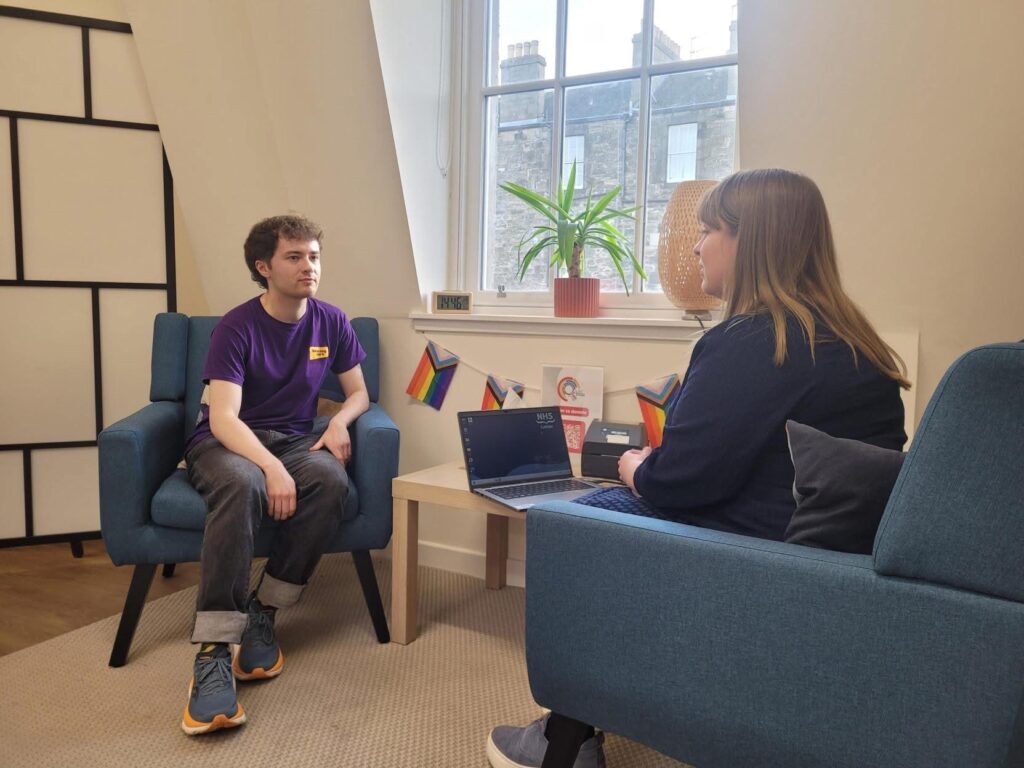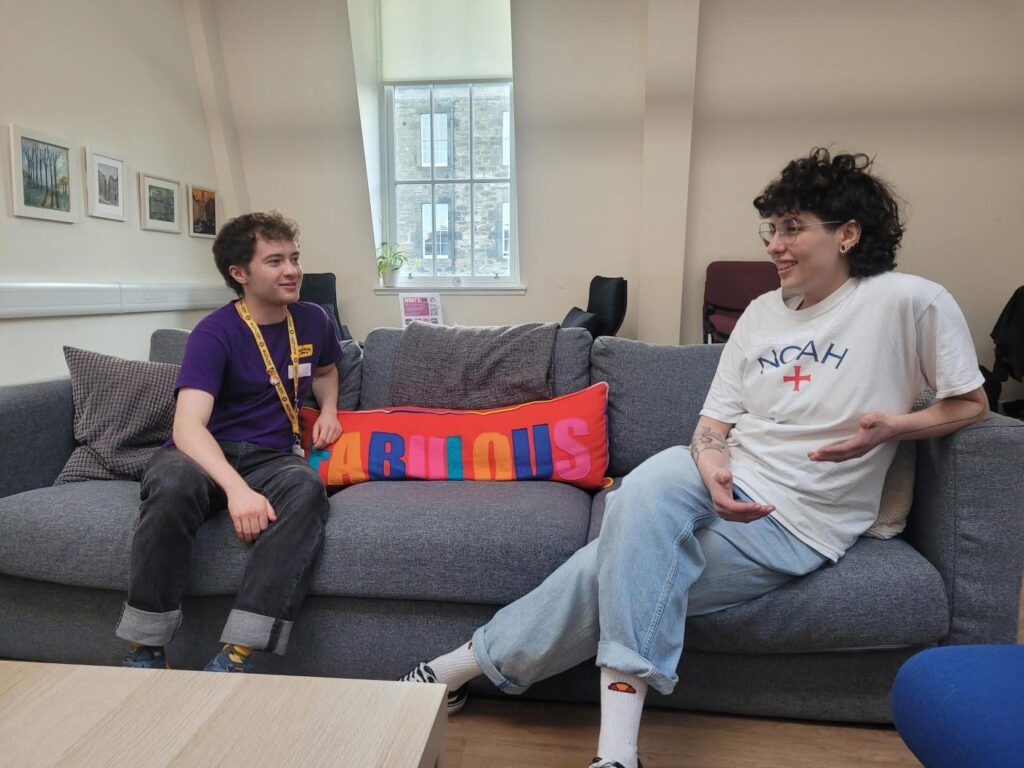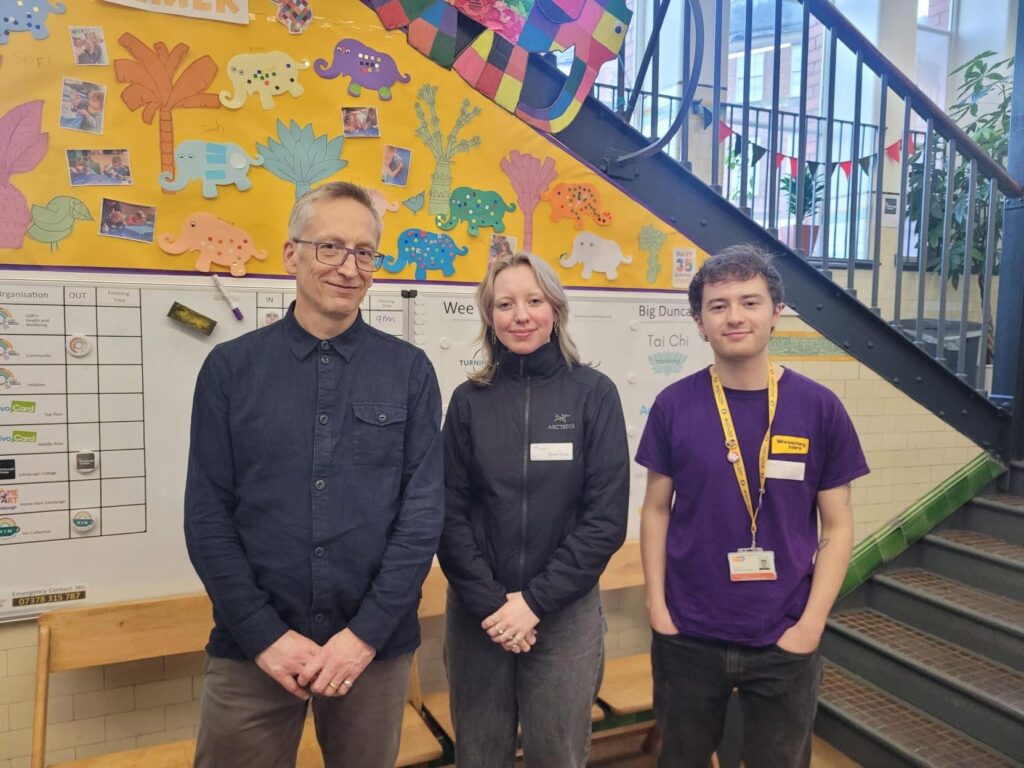
Transgender Day of Visibility: An Interview with Oliver Ellis
This Transgender Day of Visibility, we’re shining a light on a vital new sexual health clinic in Edinburgh for trans and nonbinary people in partnership with LGBT Health & Wellbeing, LGBT Youth Scotland, and NHS Lothian.
The new pilot service is aimed at addressing the unique needs and barriers faced by the community. To learn more about why this service is so crucial, we sat down with Oliver, East of Scotland Manager and one of the driving forces behind the clinic, to discuss its impact, the challenges trans and non-binary people experience in accessing sexual health services and hopes for the future of the project.
Oliver’s Journey
Oliver has been with Waverley Care for over three years. Having witnessed first hand the barriers trans and non-binary people face when accessing sexual health services, he recognised the urgent need for a clinic that was a safe, accessible space specifically for this community.

“We know these topics can be awkward and that inclusive sexual health education is severely lacking, so being able to provide a non-judgmental space for people to learn and ask questions feels really meaningful!” Oliver explains.
As a trans person, Oliver understood the challenging experience of being a trans person navigating the challenges of accessing information.
“There are so many factors – dysphoria, misgendering, stigma, discrimination – that weigh heavily on our minds. A lot of trans people avoid care until it’s a pressing issue. I hoped this clinic would be a vital source of preventative care for trans people.”
Oliver Ellis, Waverley CareWhen the idea was first proposed, I immediately thought YES, we need this!
The clinic is a vital collaboration between Waverley Care, the NHS, LGBT Health & Wellbeing, and LGBT Youth Scotland, working together to provide inclusive, comprehensive support. By combining their expertise, these organisations ensure the clinic meets the diverse needs of trans and non-binary people effectively.
The Clinic: A Response to Gaps in Sexual Healthcare
The clinic officially opened nearly a year ago, and the response has been overwhelmingly positive. Oliver says, “When the idea was first proposed, I immediately thought YES, we need this! It can be really hard for trans people to access sexual health services and information,” says Oliver.
Many past services overlooked the unique experiences of trans and non-binary people. As a result, these individuals often felt they had to conform to the service rather than the service adapting to meet their specific needs.
“Other services are not set up with trans people in mind, and it can often feel like you have to fit into the service rather than having the service work to meet your needs.”
The clinic offers a variety of essential services, including sexual health testing, PrEP, contraception, and cervical screening. This is because we understand sexual health and wellbeing are made up of many interconnected parts.
But what truly sets the clinic apart is its commitment to being a holistic and accessible space for trans and non-binary people. “We want trans and non-binary people to feel listened to and respected,” Oliver emphasises. “This isn’t just a token gesture. We want to provide tangible benefits to the community.”
We recognise that, historically, healthcare websites often present information in a binary way, overlooking the diverse experiences and sexual health needs of trans and non-binary individuals. Our goal for this clinic is to empower and support the community by providing relevant, inclusive resources that address these unique needs.
Oliver Ellis, Waverley CareThe NHS staff are great and really happy to speak about any other sexual health needs that come up.
“Providing clear information that is specifically aimed at trans people helps empower the community to have the tools to take care of our sexual health”, Oliver says.
For many trans and non-binary individuals, previous negative experiences with healthcare – such as misgendering and feeling invalidated or discriminated against – can leave lasting emotional scars, creating a significant lack of trust between the community and healthcare providers.
This can make it difficult to seek the care they need, even when it’s crucial. Often, the expectation of being treated poorly is enough to deter someone from accessing healthcare altogether.
However, Oliver talks about the more positive experiences of the clinical staff at the new clinic. He says, “The NHS staff who run the clinical side of things are great and really happy to speak about any other sexual health needs that come up, like booking people in for vaccinations.”

Addressing Unique Needs and Barriers
The clinic’s design was born from ongoing consultation with the trans and non-binary community. Oliver explains, “Every decision was made with trans and non-binary people in mind,” Oliver says. “The clinic wasn’t just created for them; it was created with them. This sense of community and understanding is key.”
Oliver emphasises that the clinic was designed with inclusivity and comfort in mind to create a space where individuals can feel at ease.
“It’s a comfortable space with cosy sofas, queer books to read, snacks, tea, and coffee. We also have accessible gender-neutral bathrooms and make sure not to make assumptions about anyone’s identity.”
With accessible gender-neutral bathrooms and a commitment to never making assumptions about anyone’s identity, the clinic strives to ensure that everyone feels welcomed, respected, and seen.
Oliver Ellis, Waverley CareIt’s providing a way in for people who might otherwise never have gone to a general healthcare setting.
Impact and Visibility
Since opening its doors, the clinic has already made a profound impact. Oliver shares, “We’ve seen a lot of positive feedback. People travel significant distances just to get to the clinic. Many have said it was the least awkward doctor’s appointment they’ve ever had!”
The clinic has been particularly effective in breaking down barriers to sexual health care, with many individuals feeling more comfortable seeking help. “People come for STI testing, but they’re also accessing other services, like contraception or PrEP,” Oliver notes. “It’s providing a way in for people who might otherwise never have gone to a general healthcare setting.”
Currently running as a pilot service in Edinburgh, we hope to see it expand across Scotland, ensuring everyone can access these vital services. “I absolutely hope it continues and grows,” Oliver says. “This clinic is the first of its kind in Scotland, and we want to make sure we do it right. I’d love to see it expand to other cities, reaching more people who need it.”

The Importance of Visibility and Inclusive Healthcare
Trans Day of Visibility is a time to recognise the resilience, strength, and achievements of transgender and gender-diverse people. For Oliver and the clinic, it’s also an opportunity to highlight the importance of creating visible, welcoming spaces for the trans and non-binary community.
“Visibility can be a beacon of hope,” Oliver explains. “Hearing positive stories from others can make a huge difference in whether someone feels comfortable accessing services.”
“We’re showing up for the trans community, and that’s incredibly important right now. Despite the transphobia we’re seeing in media and politics, there’s still a need for healthcare, and this clinic makes that a little bit easier for trans people to access.”
For Oliver, working with the trans community is deeply fulfilling, as it allows him to use his position in the sector to genuinely support and connect with others.
“The best part is just getting to talk with other trans and non-binary people about sexual health,” he shares, emphasising the comfort that comes from shared experiences. “Hearing the positive feedback from the community is especially rewarding, as it reinforces that their efforts are truly making a meaningful impact”.
For Oliver and the team at Waverley Care, the Trans and Non-Binary Sexual Health Clinic is just the beginning. “We hope this initiative will inspire other healthcare settings to do everything in their power to make sure trans people feel welcome,” he says. “We deserve good healthcare, and we’re not going anywhere.”
As the clinic continues to grow and make a difference, the goal is clear: to create a space where trans and non-binary individuals can access the care they need with dignity, respect, and understanding.
Find out more information about the clinic here.
How you can help
You can help by sharing this story, spreading awareness, or volunteering your time at the clinic. Together, we can ensure that inclusive healthcare becomes the standard for all.
